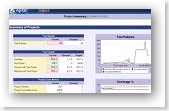Another great article relative to health care business intelligence...it has to be blessed from the top leadership and an analytical process incorporated...I can't tell you how many times with just my own small experiences I have seen over duplicated processes being worked, employees working way to hard to get the desired results, and yet find another department doing pretty close to the same thing with a different process resulting in duplicated efforts....or folks perhaps using the least desirable choice of software due to a lack of training or knowledge on choosing the appropriate software for a particular task....Business Intelligence can bring all of the various aggregated data to one location for simple and easier data mining methodologies..and create simpler methods of input for data entry, directed through well organized dashboards...BD
In order to be successful, business intelligence applications must be used. In order to be used, the people using them need to see the value of an analytical approach to the enterprise as well as to themselves. Whether or not your business intelligence initiatives pay off, therefore, depends on the culture into which you grow your business intelligence applications.
Many people do not view the world and their work analytically. Rather, they prefer to view the world in concrete, operational terms and their work as simply a sequence of tasks. Over the past two decades, I have kept a list of the people I interviewed for business intelligence projects, decision support systems, strategic planning efforts and financial modeling and analysis projects. This list has 3,746 names on it, ranging from C-level executives, directors, managers, doctors, nurses, researchers, scientists, buyers, plant managers, entrepreneurs and administrative assistants. I am not saying this is necessarily representative of the population of your organization, but it does represent a handy cross-section of roles and views toward work. I have found that about 80% prefer to work sequentially
(concrete, operational) and 20% prefer working analytically (abstract, conceptual). One approach is not right and the other wrong. After all, many of those in the eighty-percent category are out there saving lives and creating real economic and social value. But I believe that they are expending too much effort and not exploiting their talents to the fullest. An analytical approach typically leads to greater success with far less effort, as illustrated in the provided anecdote.
We immediately looked for ways to leverage the information we had in order to cut the task down to size. In this case, we found that by performing the tasks on one case, we were able to get an 8800% return on each action we took.

Propensity to combine data to get results. Very few business applications use just one source and type of data to get the job done. Even our limited application required data from four sources. Just consider how many sources are required in your organization to answer even one question such as patient profitability, outcomes analysis, efficiency analysis and so forth.
In addition, behind every successful business performance management initiative, information management architecture and embedded intelligence capability is a culture where analytical thinking fits in and works well.
Healthcare Business Intelligence Success Requires an Analytical Culture



0 comments :
Post a Comment